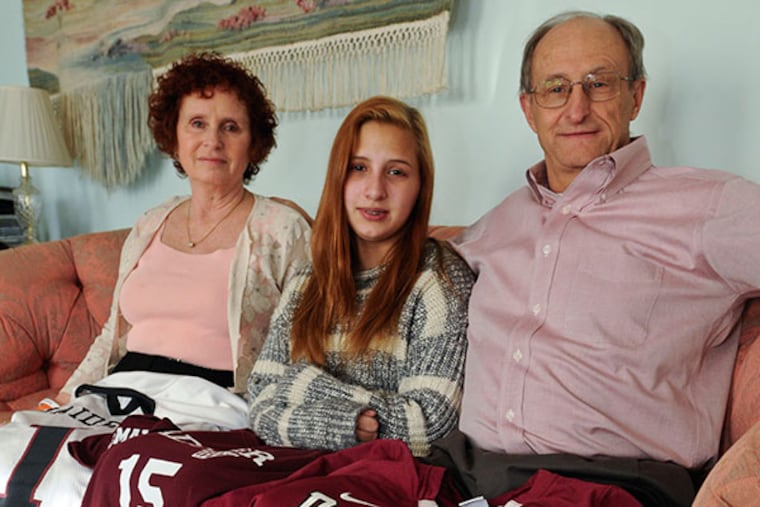After son's suicide, Main Line couple start foundation
Dan Maxwell played varsity lacrosse, football, and basketball at Radnor High School. He was a member of the National Honor Society. He had a great sense of humor, and girls at school had crushes on him.

Dan Maxwell played varsity lacrosse, football, and basketball at Radnor High School. He was a member of the National Honor Society. He had a great sense of humor, and girls at school had crushes on him.
Maxwell graduated in June. In July, he killed himself.
The end of his quiet struggle with depression shocked his Main Line community.
"At his memorial service, we talked about how we couldn't talk about it when he was sick," said his mother, Laurie Burstein-Maxwell. "His friends didn't know the extent of what was going on, and neither did our friends, because of the stigma."
Now she is sharing her son's story, in hope of ending the silence that surrounds mental illness.
In the eight months since his death, Burstein-Maxwell and her husband, Lee Maxwell, have set up the DMAX Foundation.
With Dan Maxwell's nickname as the foundation's name, plans are in the works for DMAX clubs at colleges around the country this fall, using a simple motto: Friends helping friends. The focus won't be limited to young people battling mental illness.
"Maybe a by-product ends up being helping someone, where Dan maybe wasn't able to be helped," Maxwell said at the family's Bryn Mawr home.
In a 2011 survey by the Centers for Disease Control and Prevention, 15 percent of all high school students had seriously considered suicide. That same year, 68 youths between ages 15 and 19 committed suicide in Pennsylvania, according to the state Department of Health.
Shame and stigma, the issues the DMAX Foundation aims to confront, are "two of the most significant barriers to addressing suicide risk in people of all ages," said Jonathan Singer, a professor of social work at Temple University who studies youth-suicide risk and mental health.
"If [parents] say, 'My kid is suicidal,' most people don't know what to do with that," Singer said. "Either the fear is that the parents will be blamed for being inadequate somehow, or the kid somehow will be shunned, either informally or formally."
Dan Maxwell would have turned 19 this month. His emotional health changed during his junior year of high school, beginning an 18-month battle with depression.
"He just started out saying he couldn't concentrate, and then he just got worse and worse," Burstein-Maxwell said. "He didn't want to be around anybody. And he said he was in pain all the time."
While Dan Maxwell and his parents did not tell friends about his struggles, they aggressively sought treatment. He went to two therapists and two psychiatrists, and tried a variety of medications. He spent time in a hospital, and was released just 11 days before his death.
He was an honors student from a supportive family, known for his kindness. But as his emotional health worsened, he isolated himself from his friends.
"He said: 'I know they're there. When I get better, they'll still be there,' " Burstein-Maxwell said.
On July 21, he committed suicide. At the family's request, The Inquirer is withholding the circumstances of his death.
Dan Maxwell's friends were among the more than 800 people at his memorial service, and the dozens who crowded the family's home every night for a month as they sat shivah.
Now freshmen in college, those same friends visit the Maxwell family during school vacations. They reach out to his younger sister, 14-year-old Samantha. One made a patchwork quilt from his old T-shirts and gave it to the family.
"It continues, I think for some of them, to be something that they're wrestling with, the same way we wrestle with what could we have done differently that might have made a difference," Lee Maxwell said.
Several ex-classmates have attended meetings for the DMAX Foundation held at large venues such as Radnor High School, and have said they would like to start DMAX clubs at their colleges.
As early as this fall, those groups will meet with trained facilitators to address topics, such as suicide, "that sometimes get swept under the rug," Burstein-Maxwell said. A group of psychologists, counselors, social workers, and parents is meeting weekly to develop programming.
Organizations such as Active Minds and the National Alliance on Mental Illness already have presences at many colleges, where they aim to raise awareness about mental illness.
Singer, the Temple professor, said foundations formed in memory of suicide victims have been the most effective means of working for suicide prevention.
"That's one of the things that people can do, is think about suicide not as a personal failing but as a community concern, something that can have a community-level response," he said.
Burstein-Maxwell and her husband both work as consultants; the support from friends and business connections has been "heaven-sent," she said.
Janssen Pharmaceuticals, an arm of Johnson & Johnson, has become a sponsor. Campus Crest, the student housing development company with 75 buildings in Philadelphia and around the country, wants to host DMAX clubs.
"It's not for us - we've lost our son," Lee Maxwell said. "This is for other people's kids, their kids, their friends, so it's important that people recognize that the DMAX Foundation is only as useful as the time that people put in, one way or the other."
BY THE NUMBERS
68
youths between 15 and 19 committed suicide in Pennsylvania
in 2011.
15
percent of all
U.S. high school students seriously considered
suicide in 2011.
3d
leading cause
of death for
U.S. young people between ages 10
and 24 is suicide.
4,600
approximate U.S. lives, ages 10 to 24, lost to suicide each year.
157,000
approximate U.S. young people between 10 and 24 who treated for self-inflicted injuries at emergency departments
each year.
SOURCES: Pa. Dept. of Health; Centers for Disease Control and Prevention
EndText
610-313-8116 @Lmccrystal